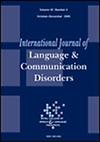German Non-Stuttering Primary School Children's Knowledge and Attitudes Towards Stuttering: International Comparison and Influencing Factors
Abstract
Background
Stuttering, as a visible and audible deviation from the norm, often provokes negative reactions and leads to social stigmatisation. Studies have shown that there is a negative stuttering stereotype, the origins of which can be traced back to early life. As environmental reactions have a significant impact on the success of therapeutic interventions, understanding public knowledge and attitudes towards stuttering is essential to mitigate these prejudices at an early stage.
Aims
The present study collects the first specific data on the knowledge of German non-stuttering primary school children about stuttering and their attitudes towards children who stutter, and relates them to the results of previous international studies. Since no data have been collected from German-speaking children to date, there was a need to replicate international studies, to include data from German-speaking children in international databases, and to discuss German results with international data in order to identify educational needs and to be able to meet them in the future.
Methods and Procedures
A total of 78 German-speaking primary school children aged 6 to 11 were interviewed using a newly translated and adapted German version of the Public Opinion Survey of Human Attributes-Stuttering/Child. Participants were recruited via stakeholders (e.g., principals, teachers). Influencing factors like socio-demographic variables and previous experience with persons who stutter were included in the analysis. The data were analysed descriptively and statistically in comparison with international data and group comparisons.
Outcomes and Results
The sample (M = 8.7 yr; Nfemale = 47, Nmale = 28, Nother = 3) showed uncertain knowledge and rather neutral, partly negative attitudes towards stuttering. Three key knowledge gaps were evident in the domains of character traits and personality of individuals who stutter, the causes of stuttering and supportive behaviour. Stuttering as an abstract behavioural attribute was overall rated more negatively than the actual person who stutters him- or herself. Personal experience was identified as a factor potentially influencing non-stuttering children's reactions to people who stutter in a positive way. Results of German-speaking children are basically in line with data from international studies. Comparisons will be discussed in this article.
Conclusions and Implications
The identified gaps in knowledge and the partly negative attitudes underline the continuing need for psychoeducational interventions in childhood, in particular, providing options for non-stuttering children to gain direct personal experience with stuttering children. In practice, educational interventions should provide information, particularly in relation to the three identified key knowledge gaps.
WHAT THIS PAPER ADDS
- To date, data on the knowledge and attitudes of non-stuttering children have been collected in the United States of America, Portugal, Bosnia and Herzegovina, Poland, and Turkey. The studies have identified a negative stuttering stereotype that can be present from a young age and have a negative impact on the quality of life of children who stutter. Prior to the study, no data were available for German-speaking countries, and there were also no German survey instruments that could measure the variables of interest in the target group.
- The study provides data on the knowledge and personal attitudes of German non-stuttering primary school children collected with the newly translated and adapted German version of the Public Opinion Survey of Human Attributes-Stuttering/Child (POSHA-S/Child). The results of the German sample are essentially consistent with previous international studies. The variable personal experience has been identified as a key predictor variable for the improvement of reactions to a person's stuttering.
- The study supports, clarifies and underlines the international need for educational interventions. In the German sample, three key areas were identified: Character traits and personality of people who stutter, causes of stuttering, and supportive behaviour. Educational interventions should provide appropriate knowledge and provide a platform for exchange in order to gain personal experience with people who stutter.

 求助内容:
求助内容: 应助结果提醒方式:
应助结果提醒方式:


